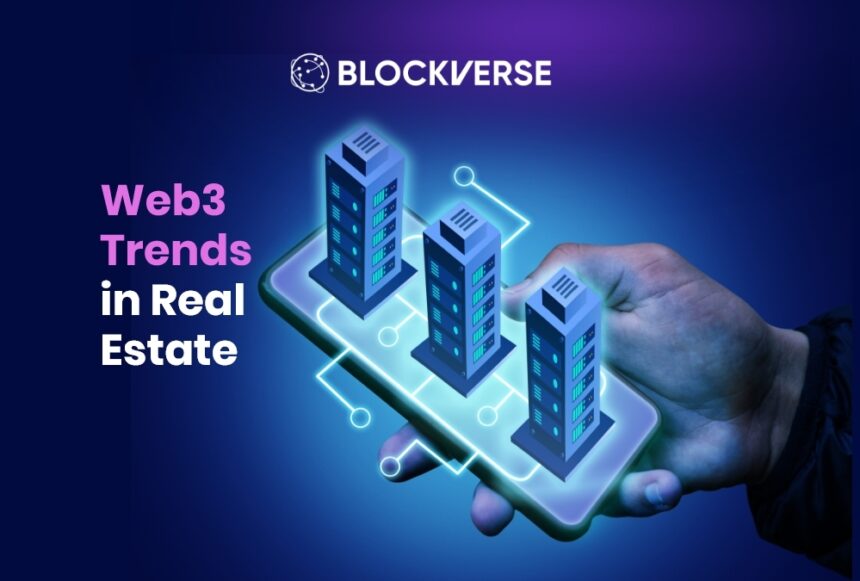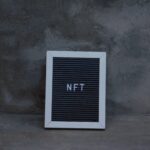Web3 has marked a revolutionary shift in the digital landscape, introducing concepts of decentralization, blockchain technology, and tokenization that have already redefined several industries. Among these, the real estate sector is a prominent example of an industry undergoing significant transformations. This shift is not just a passing trend but a pivotal point in the industry, and ongoing web3 trends in real estate signal good times incoming. Global cities like Singapore, Dubai, New York are already seeing a ton of activity between their web3 and real estate sectors – putting apartments on the blockchain, tokenizing properties, and what not.
Real estate, traditionally characterized by physical assets and conventional transaction methods, is now intersecting with the innovative and decentralized nature of Web3. This intersection introduces a novel approach to:
- Property ownership,
- Management, and
- Investment.
Web3 real estate is a burgeoning field that combines the trust and security of blockchain technology with the vast potential of digital assets and transactions.
Our focus here is to understand how web3 is transforming the real estate sector. This transformation is not just about adopting new technology; it’s a fundamental shift in how properties are bought, sold, and managed. The web3 trend in real estate signifies a move towards more transparent, efficient, and accessible real estate dealings.
To understand how that works, we need to understand the impact web3 is having.
Web3’s Impact on Real Estate
One of the most groundbreaking aspects of this merger of web3 and real estate is the decentralization of transactions. Unlike traditional methods, where centralized entities like banks and real estate agencies play a significant role, web3 real estate transactions are peer-to-peer. This change leads to more direct dealings – lowering costs and increasing efficiency.
Another pivotal element is the use of smart contracts in real estate.
Smart contracts automatically execute and enforce the terms of a real estate agreement upon meeting predefined conditions. For example – paperwork can be automatically generated once an amount has been paid up, or rent can be transferred once received. Smart contracts in property transactions ensure a higher level of security and trust, automating various processes and minimizing the likelihood of disputes.
The tokenization of real estate assets is another super interesting web3 trend. It involves converting the value of a real estate property into digital tokens on the blockchain. This approach opens up new avenues for investment, allowing for fractional ownership and easier liquidity of real estate assets.
Web3 Trends in Real Estate
Interesting web3 trends in real estate are driving a digital transformation, redefining the very nature of real estate ownership and investment and changing how we buy and sell property. I’ll now explore five key web3 trends in real estate that are reshaping the business, and learn how business leaders can prepare for this transformative era!
Fractional Ownership & Tokenization: Properties as Tokens

One of the most bullish web3 trends in real estate is the one we just touched upon – the concept of properties as tokens. Traditional real estate ownership often involves lengthy legal processes and paperwork. With web3 for real estate, properties can be represented as digital tokens on blockchain networks. These tokens are not only easily transferable but also divisible, allowing for fractional ownership. This trend is democratizing real estate investment by making it accessible to a wider range of investors. Already, nations like India are pushing real estate tokenization officially.
Tokenization converts real-world assets, such as properties, into digital tokens on blockchain networks. These tokens represent fractional ownership rights and can be easily bought, sold, and traded.
As a web3 real estate trend, here are some notable benefits of properties as tokens:
- Investors can purchase fractions or shares of a property, making real estate investments accessible to a broader range of individuals. Ownership is now no longer confined to acquiring an entire property. This fractional ownership model democratizes the market, allowing everyone to participate in real estate investment.
- Buying or selling a property often involves protracted timelines and significant transaction costs. However, real estate tokenization takes care of this. With properties represented as tokens, transactions can occur in minutes, opening up a world of possibilities for buyers and sellers.
- Blockchain technology, the backbone of web3, brings unparalleled transparency and security to property transactions. Every tokenized property transaction is recorded on an immutable ledger, providing a tamper-proof record of ownership.
- Global accessibility combined with fractional investment, is another notable web3 trend in real estate which expands the pool of potential investors and drives increased liquidity in the market.
NFT Deeds

Coming in second among the notable web3 trends in real estate is NFT deeds. Non-fungible tokens (NFTs) have taken the virtual world by storm and are making their way into the real estate sector. When you’re not transferring NFTs to your wallet though, you can use them to represent ownership deeds and titles.
This innovation not only simplifies property transactions but also enhances the security and authenticity of ownership records. Here are some important changes NFTs are bringing in web3 real estate:
- NFTs, built on blockchain technology, offer an immutable ledger for recording property ownership. And the blockchain’s transparency allows the property ownership records to be easily accessible and verifiable by authorized parties.
- NFT deeds also embrace the concept of fractional ownership, enabling multiple parties to own and invest in a property while maintaining transparent and secure records of their respective ownership shares.
- NFT deeds could lead to the emergence of secondary real estate markets. Property owners might tokenize their real estate assets and offer them for sale on NFT marketplaces, allowing for more accessible liquidity and trade of real estate ownership.
Crypto Mortgages

Cryptocurrencies are increasingly being used to facilitate real estate transactions, including mortgages. Web3 real estate makes it possible to create smart contracts that automate mortgage payments and verification processes. This reduces the need for intermediaries, streamlines transactions, and enhances security.
Here are the notable advantages to using crypto mortgages-
- Crypto mortgages leverage the transparency and security of blockchain to create a decentralized lending environment. Through blockchain-based platforms, borrowers can secure financing from a global pool of lenders without the constraints of traditional financial institutions.
- Crypto mortgages utilize cryptocurrency payments, which are seamlessly integrated into smart contracts. This means that mortgage repayments are automatically deducted from the borrower’s cryptocurrency wallet and recorded on the blockchain. This automation reduces the risk of missed payments and ensures transparency in the repayment process.
- Blockchain technology underpins crypto mortgages, providing an immutable and tamper-proof ledger of all transactions.
- Crypto mortgages often involve the use of cryptocurrencies as collateral. Borrowers can pledge their digital assets, such as Bitcoin or Ethereum, as collateral for the loan. This collateralization reduces the need for traditional credit checks, making mortgages accessible to a broader range of individuals, including those without a traditional credit history.
Metaverse

The metaverse is a hot topic in web3 discussions. While some see it as mere hype, others believe it could be the next major frontier. Real estate in the metaverse is gaining traction, with virtual land and property ownership becoming a reality.
As one of the prominent web3 trends in real estate, here are the benefits of metaverse:
- In the metaverse, virtual real estate exists as digital land or property. Web3 technologies, including blockchain, enable creation and ownership of these digital assets. This concept has real-world implications, as virtual property ownership can be tied to physical properties or serve as a platform for digital businesses.
- Web3-driven metaverse platforms can revolutionize how real estate is marketed and sold. Imagine potential buyers exploring a virtual representation of a property, complete with immersive 3D tours, long before setting foot on physical grounds. This can enhance the efficiency of the real estate market and reduce the need for in-person visits.
- As remote work becomes more prevalent, Metaverse can provide a dynamic platform for virtual offices and co-working spaces. Real estate developers may invest in creating these digital office environments, offering new opportunities for integrating physical and virtual real estate.
Case Studies: Real-World Examples of Web3 in Real Estate
A. Tokenized Property Investments
- Tokenized Commercial Real Estate: There have already been projects where a commercial building’s value was divided into digital tokens, allowing multiple investors to own a portion of the property. This fractional ownership approach democratizes real estate investment, making it accessible to a broader audience.
- Residential Property Tokenization: An innovative venture involved a residential complex being tokenized, enabling fractional ownership and easy trading of property shares on blockchain platforms.
B. Smart Contracts in Property Transactions
- Automated Lease Agreements: Real estate firms can utilize smart contracts for leasing commercial spaces, significantly reducing paperwork and ensuring automatic compliance with lease terms.
- Sale-Purchase Agreements: An instance where a property sale was executed entirely through a smart contract, ensuring a secure, transparent, and efficient transaction process.
C. Decentralized Real Estate Platforms
- Peer-to-Peer Property Trading: If there isn’t one already, there will soon be platform that facilitates direct real estate trading between buyers and sellers using blockchain, eliminating the need for intermediaries and reducing transaction costs.
- Decentralized Real Estate Marketplaces: An online marketplace using Web3 technologies to list and trade properties, offering a more transparent and user-friendly experience compared to traditional real estate portals.
D. Challenges and Learning
- Regulatory Hurdles: Examples of projects facing legal challenges, illustrating the need for clearer regulations in the Web3 real estate space.
- Technical Challenges and Solutions: Instances where projects encountered technical obstacles in implementing blockchain technology, and the innovative solutions they devised to overcome these challenges.
Each of these examples showcases the practical application and impact of Web3 trends in real estate, highlighting both the successes and the obstacles faced in this rapidly evolving field.
The Future of Web3 Trends in Real Estate
Clearly the future of real estate with web3 seems super bullish. That isn’t to say it has some uncertainties though. Predictions suggest a continued rise in the adoption of blockchain and smart contracts in both commercial and residential real estate markets. This shift could lead to more transparent, efficient, and user-friendly property transactions.
The potential impact on commercial and residential markets is vast. In commercial real estate, Web3 could streamline leasing processes, enhance property management systems, and introduce new investment models. In residential real estate, it could simplify the home buying process, enhance security in transactions, and provide new ownership structures.
Challenges of Web3 Real Estate
One of the key issues is regulatory uncertainty, as governments grapple with how to regulate decentralized property transactions and NFT-based ownership. Security concerns also loom large, with the risk of cyberattacks on blockchain networks or fraudulent NFT sales. The technology itself is still evolving, leading to scalability and interoperability challenges.
Additionally, the integration of traditional real estate practices with web3 systems poses a learning curve for industry professionals.
Lastly, the potential for a lack of recourse in case of disputes or issues with smart contracts and blockchain-based ownership models is perhaps the biggest concern. Overcoming these challenges is essential for the successful adoption of web3 in the real estate sector.
The Age of Web3 is Nigh
We have learnt the prevalent web3 trends in real estate, as well as how web3 real estate is reshaping the business of real estate in profound ways. From listing properties as tokens in decentralized marketplaces, to NFT-based deeds to fractionalized investments to crypto mortgages and the metaverse, these trends are not just the latest buzzwords but transformative forces redefining how we buy, sell, finance, and experience real estate.
The real estate industry’s transformation is underway, and those who adapt and harness the power of web3 technologies stand to thrive in this new era of property ownership and investment.



